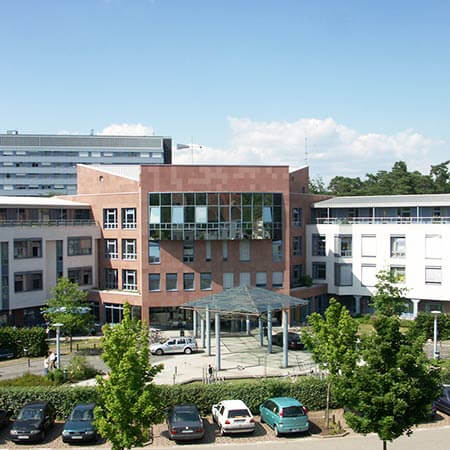Brain Hemangioma — Platinum Coils Embolization (coiling): treatment in the Best Hospitals in the World
Treatment prices are regulated by national law of the corresponding countries, but can also include additional hospital coefficients. In order to receive the individual cost calculation, please send us the request and medical records.

Department of Interventional Neuroradiology
The Department of Interventional Neuroradiology offers the full range of services in the areas of its specialization. The medical facility provides imaging diagnostics and low-traumatic image-guided interventional treatment of nervous system diseases. The department's specialists have rich experience and exceptional professional skills in the field of interventional procedures for acute and chronic vascular diseases, such as ischemic strokes, brain hemorrhages, cerebral artery stenosis, brain aneurysms, and vascular malformations. The department's neuroradiologists cooperate closely with neurologists and neurosurgeons so that each patient receives an optimal treatment regimen based on the expert opinions of the specialists. The department's medical team has state-of-the-art computed tomography (CT), magnetic resonance imaging (MRI), and MR angiography systems that are actively used for diagnosing patients and therapeutic procedures. Medical care is provided in compliance with current clinical protocols. The department also offers many outpatient medical services, which is an advantage for many patients.




Department of Adult and Pediatric Diagnostic, Interventional Neuroradiology
The Department of Adult and Pediatric Diagnostic, Interventional Neuroradiology offers the widest range of services for the diagnostics and treatment of diseases of the brain, spinal cord and peripheral nerves using the advanced imaging systems. The department is equipped with modern technical devices, including 64-slice CT scanner, 1,5 and 3,0 Tesla MRI, biplane angiography system with 3D imaging of the blood vessels and bone structures, system for myelography of the entire spine and ultrasound scanners. All these devices are used not only for the diagnostics, but also for interventional procedures to treat obstructions, stenoses and other pathological vascular lesions in the head, neck and spine. The most popular interventional therapeutic procedures include clipping and coiling of cerebral vascular aneurysms, as well as cerebral vascular malformations. The department's doctors cooperate closely with specialists in the field of neurosurgery, neurology and pediatric neurology. Such an approach guarantees the patient a comprehensive assessment of the state of the nervous system and a favourable treatment outcome.





Department of Interventional Radiology
The Department of Interventional Radiology offers the full range of imaging examinations, as well as innovative image-guided minimally invasive techniques for the treatment of tumors, vascular diseases and internal pathologies (for example, CT, MRI, PET-CT, SPECT). The department's doctors have deep knowledge and colossal experience in the field of interventional radiological methods of treatment, which represent an excellent alternative to open surgical interventions. Despite the high level of technical equipment and the presence of advanced computerized systems, the focus is always on the person with his individual needs. Compliance with current clinical protocols and high professionalism of the department's specialists contribute to the successful clinical practice, as well as the reputability of the department among the best medical facilities of this kind in Germany.



Brain hemangioma is a benign vascular tumor. It consists of deformed venous vessels separated by cavities (caverns). As a rule, these are congenital neoplasms. Much less often they are post-traumatic ones. Hemangiomas can be located anywhere in the brain. They are more common in the hemispheres, but they can also be present in the brainstem (especially dangerous localization). In one case out of ten brain hemangiomas may be multiple.
Overview
Brain hemangioma, which is also called intracranial hemangioma or angioma of the central nervous system, is a malformation of the blood vessels. In addition to the brain, vascular tumors can develop in such organs as the kidneys, liver, lungs, skin, and nasal mucosa. Brain hemangiomas are diagnosed mainly in patients over forty. These vascular pathologies are found in people of any race, ethnicity, and gender.
There are two general types of hemangiomas, i.e. hereditary and sporadic ones. Hereditary brain hemangiomas are caused by genetic mutations that are passed down from parents to children for generations. Sporadic vascular neoplasms are not connected with heredity and occur spontaneously.
The exact factors that increase the risk of developing brain hemangioma are unknown. However, scientists believe that patients who have undergone radiation therapy of the head area are at higher risk of brain hemangioma development.
Although the exact causes are not known, scientists suggest that the risk of brain hemangioma is increased in the following groups of people:
- Patients who have had head irradiation during childhood
- Patients with previous intracerebral hemorrhages
- Individuals with a family history of cerebral hemangioma
In most cases, brain hemangioma is sporadic and does not depend on the mentioned above conditions.
It is important to understand that the presence of risk factors does not mean that a person will necessarily develop a hemangioma. At the same time, these vascular neoplasms can occur in patients who are not at risk.
Symptoms
Symptoms of brain hemangioma include headaches, partial loss of muscle control, and sensory impairment. Complications include bleeding from the tumor, secondary infections, and neurological problems.
A tumor can occur for a variety of reasons: due to stress, improper lifestyle, or congenital predisposition. The disease carries certain risk of developing cerebral hemorrhage.
About 25% of brain tumors are asymptomatic. However, sudden bleeding may require immediate treatment. Unfortunately, there are currently no methods for preventing the development of cerebral hemangioma.
Brain hemangioma symptoms caused by thrombosis of abnormal vessels depend on the localization of the neoplasm. Common manifestations of this brain tumor are:
- Headaches
- Nausea and vomiting
- Unsteady gait
- Violation of muscle control and movement coordination
- Difficulty swallowing
- Convulsions
- Hemorrhage from a brain tumor (pregnant women are at a higher risk of intracerebral hemorrhage)
It should be noted that people who already suffer from brain diseases or have had a stroke are at particular risk. But even in this case, life-threatening consequences can be avoided by contacting a doctor timely. Brain hemangioma in adults can occur against the background of the following symptoms:
- Seizures
- Loss of vision or hearing
- Impaired movements coordination
- Mental instability
- Decreased memory and impaired speech
Diagnostics
Diagnosis of brain hemangioma at the best hospitals in the world is carried out using innovative laboratory and research methods. Diagnostics begins with an assessment of complaints and anamnesis. If a brain hemangioma is suspected, the following examinations are performed:
- MRI of the brain (is performed to look for a mass that has a characteristic popcorn-like shape)
- CT scan with contrast agent (is performed to clarify the characteristics of the brain hemangioma, such as size, shape, proximity to vital brain structures, etc.)
Other methods are of secondary importance. For example, ophthalmoscopy may detect an increase in intracranial pressure or a mechanical effect of the tumor on the optic nerve. With the help of cerebral angiography, it is impossible to diagnose brain hemangioma, but an aneurysm can be detected, thus making a differential diagnosis with it.
Since the leading method of treatment of brain hemangioma is surgical removal, additional research is needed to clarify all its characteristics. Its relation with the surrounding brain structures is specified with high accuracy.
For example, MRI tractography is performed. This is an MRI in a special mode that allows obtaining an image with the orientation of the pathways of the brain. All this information is needed to create computer models of the brain and the hemangioma location in it. They are used in neuronavigation and stereotaxic neurosurgery, ensuring the maximum accuracy of the actions of a surgeon when excising a neoplasm near the important functional areas of the brain.
Some pathologies have symptoms and manifestations that are similar to brain hemangioma. The specialists can recommend additional diagnostic tests to exclude other diseases and make a final diagnosis.
Treatment
Surgical treatment is a first-line treatment for brain hemangiomas. In some cases, radiation therapy is also used.
In most cases, the hemangioma can be removed using a microsurgical method, i.e. through a small hole in the skull. Tumors localized in hard-to-reach places, including those around the brainstem, are destroyed using brain tumor embolization.
Embolization is a minimally invasive treatment that involves the occlusion of one or more blood vessels in a vascular malformation.
Brain tumor embolization is performed with special embolizing substances (drugs or coils) that are injected into a blood vessel through a catheter. Embolizing substances disrupt the blood supply of a target area.
Before the brain tumor embolization procedure, the doctor prescribes an instrumental examination: ultrasound scanning, computed tomography (CT), and/or magnetic resonance imaging (MRI). Minimally invasive imaging-guided procedures, such as catheter embolization, should be performed by an interventional radiologist in the operating room.
If the embolization is performed under local anesthesia, then sedative drugs are injected intravenously, which is accompanied by drowsiness and a feeling of relaxation. Depending on the degree of sedation, the patient's consciousness may or may not be preserved.
To control the heartbeat, pulse, and blood pressure during the embolization procedure, devices are used that are connected to the patient's body. Then a pinpoint skin incision or small puncture is performed. A catheter (a long, thin, and hollow plastic tube) is guided through the skin to the pathologically altered vessels under imaging guidance. The introduction of the catheter is accompanied by light pressure, but there is no pronounced pain.
When treating brain tumors, a control injection of a small amount of an embolizing substance is initially performed, followed by a neurological examination of the patient. This allows doctors to make sure that there is no negative effect on important parts of the brain. With normal examination results, the full dose of embolizing drug is injected. With the introduction of contrast material, a sensation of warmth or heat often appears.
To determine the exact location of a brain tumor or the cause of bleeding, a contrast agent is injected through the catheter, after which a series of X-rays are made. After the procedure is completed, an additional series of images is required to ensure that there is no residual blood flow in the tumor.
At the end of the brain tumor embolization, the catheter is removed, the bleeding is stopped, and a pressure bandage is applied to the wound. No suturing is required.
The most common side effect of brain tumor embolization is pain, which can be controlled with pills or injections of pain relievers. The onset of symptoms is associated with the body's reaction to the products of the tumor degradation and most often develop during embolization of a rather large brain tumors.
In most cases, after treatment, the patient stays in the hospital for a day, but severe pain syndrome requires a longer hospitalization. The recovery period is usually about a week.
Where can I undergo platinum coils embolization (coiling) abroad?
Health tourism is becoming more and more popular these days, as medicine abroad often ensures a much better quality of platinum coils embolization (coiling).
The following hospitals show the best success rates in platinum coils embolization (coiling):
- University Hospital Saarland Homburg, Germany
- HELIOS University Hospital Wuppertal, Germany
- University Hospital Rechts der Isar Munich, Germany
- Vivantes Neukölln Hospital Berlin, Germany
- University Hospital Ulm, Germany
You can find more information about the hospitals on the Booking Health website.
The cost of treatment abroad
The prices in hospitals listed on the Booking Health website are relatively low. With Booking Health, you can undergo platinum coils embolization (coiling) at an affordable price.
The cost of treatment varies, as the price depends on the hospital, the specifics of the disease, and the complexity of its treatment.
The cost of treatment with platinum coils embolization (coiling) in Germany is 17,178-34,414 EUR.
You might want to consider the cost of possible additional procedures and follow-up care. Therefore, the ultimate cost of treatment may differ from the initial price.
To make sure that the overall cost of treatment is suitable for you, contact us by leaving the request on the Booking Health website.
How can I undergo platinum coils embolization (coiling) abroad?
It is not easy to self-organize any treatment abroad. It requires certain knowledge and expertise. Thus, it is safer, easier, and less stressful to use the services of a medical tourism agency.
As the largest and most transparent medical tourism agency in the world, Booking Health has up-to-date information about platinum coils embolization (coiling) in the best hospitals. We will help you select the right clinic taking into account your wishes for treatment.
We want to help you and take on all the troubles. You can be free of unnecessary stress, while Booking Health takes care of all organizational issues regarding the treatment. Our services are aimed at undergoing platinum coils embolization (coiling) safely and successfully.
Medical tourism can be easy! All you need to do is to leave a request on the Booking Health website, and our manager will contact you shortly.

